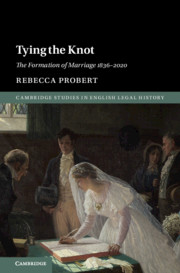Book contents
- Tying the Knot
- Cambridge Studies in English Legal History
- Tying the Knot
- Copyright page
- Dedication
- Contents
- Preface and Acknowledgements
- Abbreviations
- 1 Introduction
- 2 Conception, Design, and Implementation, 1819–1837
- 3 Reactions to the Act, 1837–1854
- 4 Amendments Enacted and Reform Deferred, 1855–1872
- 5 Differences, Divisions, and Dispensing with the Registrar, 1873–1899
- 6 Competing Conceptions of Marriage, 1900–1919
- 7 Consolidating Complexity, 1920–1949
- 8 Convergence? 1950–1993
- 9 The Rise of the Wedding, 1994–2020
- 10 The Legacy of the Past and Lessons for the Future
- Index
6 - Competing Conceptions of Marriage, 1900–1919
Published online by Cambridge University Press: 10 September 2021
- Tying the Knot
- Cambridge Studies in English Legal History
- Tying the Knot
- Copyright page
- Dedication
- Contents
- Preface and Acknowledgements
- Abbreviations
- 1 Introduction
- 2 Conception, Design, and Implementation, 1819–1837
- 3 Reactions to the Act, 1837–1854
- 4 Amendments Enacted and Reform Deferred, 1855–1872
- 5 Differences, Divisions, and Dispensing with the Registrar, 1873–1899
- 6 Competing Conceptions of Marriage, 1900–1919
- 7 Consolidating Complexity, 1920–1949
- 8 Convergence? 1950–1993
- 9 The Rise of the Wedding, 1994–2020
- 10 The Legacy of the Past and Lessons for the Future
- Index
Summary
The first two decades of the twentieth century saw new challenges to the laws governing both marriage and weddings emerging on all sides. Involving in turn Anglican, Catholic, Jewish, Sikh, Hindu, and Muslim conceptions of marriage, these different challenges all involved the question of the relationship between the law as set out in statute and the law of an individual’s own religion. Whenever this issue came before the courts, the judges were clear that there was one single conception of marriage in England and Wales, and that this was the same regardless of the religion of the parties or how they had married. In this respect the Church of England was in the same position as any other religious group: its clergy had the right to refuse to conduct the marriages of individuals within the formerly prohibited degrees, but not to refuse to recognize such marriages as valid. Nonetheless, the insistence by the courts that English law recognised only Christian marriage did send a very clear message that not all religions were equal in its eyes. While the term ‘Christian’ was at one level merely shorthand for monogamous marriage, it conveyed much more than this.
Keywords
- Type
- Chapter
- Information
- Tying the KnotThe Formation of Marriage 1836–2020, pp. 147 - 169Publisher: Cambridge University PressPrint publication year: 2021



